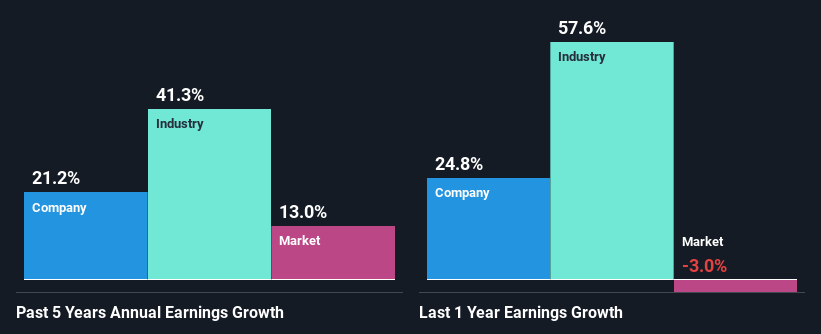Stock Analysis
- United States
- /
- Energy Services
- /
- NYSE:WHD
Is Cactus, Inc.'s (NYSE:WHD) Recent Stock Performance Tethered To Its Strong Fundamentals?

Cactus' (NYSE:WHD) stock is up by a considerable 23% over the past three months. Since the market usually pay for a company’s long-term fundamentals, we decided to study the company’s key performance indicators to see if they could be influencing the market. Particularly, we will be paying attention to Cactus' ROE today.
Return on equity or ROE is a key measure used to assess how efficiently a company's management is utilizing the company's capital. In simpler terms, it measures the profitability of a company in relation to shareholder's equity.
See our latest analysis for Cactus
How Is ROE Calculated?
The formula for ROE is:
Return on Equity = Net Profit (from continuing operations) ÷ Shareholders' Equity
So, based on the above formula, the ROE for Cactus is:
19% = US$212m ÷ US$1.1b (Based on the trailing twelve months to March 2024).
The 'return' is the amount earned after tax over the last twelve months. One way to conceptualize this is that for each $1 of shareholders' capital it has, the company made $0.19 in profit.
Why Is ROE Important For Earnings Growth?
So far, we've learned that ROE is a measure of a company's profitability. We now need to evaluate how much profit the company reinvests or "retains" for future growth which then gives us an idea about the growth potential of the company. Generally speaking, other things being equal, firms with a high return on equity and profit retention, have a higher growth rate than firms that don’t share these attributes.
Cactus' Earnings Growth And 19% ROE
At first glance, Cactus seems to have a decent ROE. Especially when compared to the industry average of 14% the company's ROE looks pretty impressive. Probably as a result of this, Cactus was able to see an impressive net income growth of 21% over the last five years. We reckon that there could also be other factors at play here. Such as - high earnings retention or an efficient management in place.
We then compared Cactus' net income growth with the industry and found that the company's growth figure is lower than the average industry growth rate of 41% in the same 5-year period, which is a bit concerning.

Earnings growth is a huge factor in stock valuation. It’s important for an investor to know whether the market has priced in the company's expected earnings growth (or decline). This then helps them determine if the stock is placed for a bright or bleak future. What is WHD worth today? The intrinsic value infographic in our free research report helps visualize whether WHD is currently mispriced by the market.
Is Cactus Using Its Retained Earnings Effectively?
Cactus has a three-year median payout ratio of 27% (where it is retaining 73% of its income) which is not too low or not too high. So it seems that Cactus is reinvesting efficiently in a way that it sees impressive growth in its earnings (discussed above) and pays a dividend that's well covered.
Additionally, Cactus has paid dividends over a period of five years which means that the company is pretty serious about sharing its profits with shareholders. Our latest analyst data shows that the future payout ratio of the company is expected to drop to 14% over the next three years. However, the company's ROE is not expected to change by much despite the lower expected payout ratio.
Conclusion
Overall, we are quite pleased with Cactus' performance. Specifically, we like that the company is reinvesting a huge chunk of its profits at a high rate of return. This of course has caused the company to see a good amount of growth in its earnings. Having said that, looking at the current analyst estimates, we found that the company's earnings are expected to gain momentum. Are these analysts expectations based on the broad expectations for the industry, or on the company's fundamentals? Click here to be taken to our analyst's forecasts page for the company.
Valuation is complex, but we're helping make it simple.
Find out whether Cactus is potentially over or undervalued by checking out our comprehensive analysis, which includes fair value estimates, risks and warnings, dividends, insider transactions and financial health.
View the Free AnalysisHave feedback on this article? Concerned about the content? Get in touch with us directly. Alternatively, email editorial-team (at) simplywallst.com.
This article by Simply Wall St is general in nature. We provide commentary based on historical data and analyst forecasts only using an unbiased methodology and our articles are not intended to be financial advice. It does not constitute a recommendation to buy or sell any stock, and does not take account of your objectives, or your financial situation. We aim to bring you long-term focused analysis driven by fundamental data. Note that our analysis may not factor in the latest price-sensitive company announcements or qualitative material. Simply Wall St has no position in any stocks mentioned.
About NYSE:WHD
Cactus
Designs, manufactures, sells, and leases pressure control and spoolable pipes in the United States, Australia, Canada, the Middle East, and internationally.
Flawless balance sheet with reasonable growth potential.


